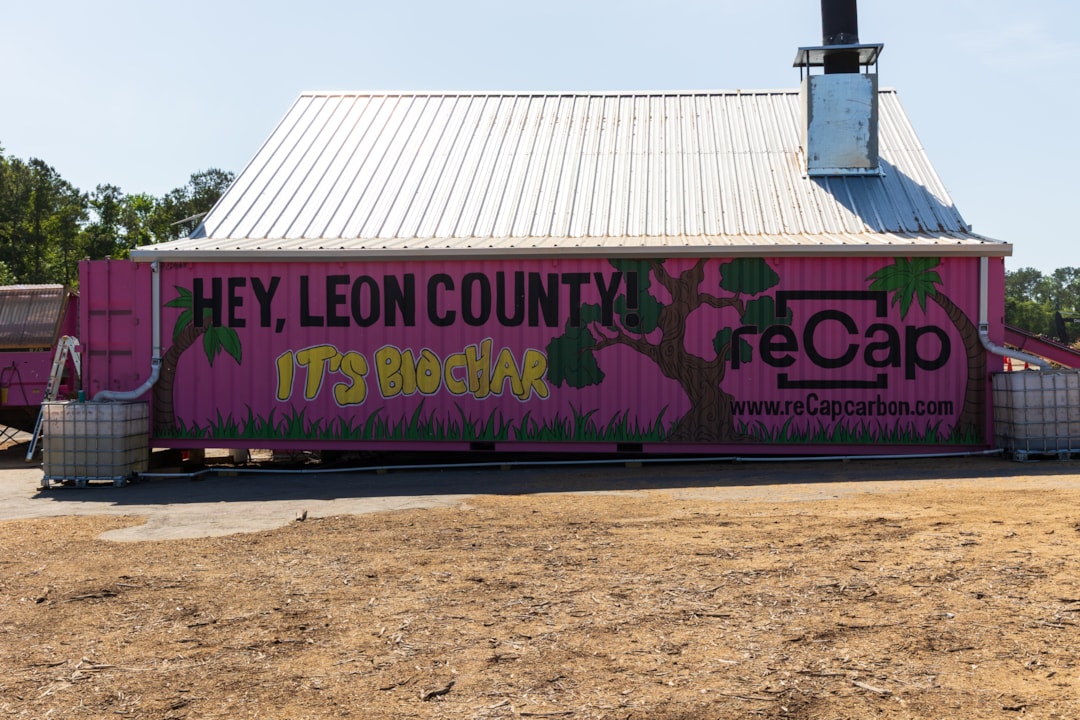Leon County Biochar Program

Leon County Government is eager to host an exciting new project by reCap to convert a portion of our community’s yard debris into biochar. Biochar is a charcoal-like substance produced from organic matter, such as yard debris, that is widely used internationally and is growing in popularity in the United States. This carbon-negative process causes little to no noise, odor, pollution, or other byproducts. ReCap’s facility in Leon County is the first biochar production facility in North America to utilize a patent-pending process that upcycles greenwaste, or yard debris, into beneficial and carbon-capturing biochar.
You may be wondering...
What is biochar?
Biochar is an organic charcoal-like material made from pyrolysis (roasting yard debris in the absence of oxygen). It was originally developed thousands of years ago by farmers along the Amazon River basin in Brazil who would burn remnant agricultural waste in earthen pits, later distributing the char across their fields for use as a soil amendment. Incorporated into the soil, biochar helps to attract beneficial microorganisms, reduce soil density, and increase nutrient and water retention. Thousands of peer-reviewed scientific articles have demonstrated biochar’s ability to reduce the need for chemical fertilizers and irrigation while at the same time increasing crop yields. Beyond agriculture, there are several promising uses for biochar in stormwater purification, infrastructure, building materials, energy capture and storage, and food preservation among others.
Who is reCap?
ReCap is a Florida-based start-up business that partners with communities to reduce greenhouse gas (GHG) emissions and be better resource stewards. Although the creation of biochar has occurred for thousands of years, reCap utilizes unique, patented technology and a patent-pending process that effectively stops the natural decaying process of yard debris, which can prevent as much as twenty tons of GHG emissions per ton of biochar from being released into the atmosphere.
Learn more about reCap here!
How does this project work?
Our community generates approximately 175 pounds of greenwaste a year for every County resident. That’s more than enough to entirely fill the Florida State Capitol building. The partnership is a win-win, as Leon County will support the advancement of this patent-pending process while reducing its own greenhouse gas (GHG) emissions. Starting in November 2022, the County provided the yard waste as feedstock, allowing reCap’s equipment to be placed onsite at the Leon County Solid Waste Management Facility (7550 Apalachee Parkway). Operated by reCap, the patented equipment is modular, planned to be powered off of solar and its own energy, and creates little noise and odors. The 2024 long-term agreement is intended to result in reCap scaling up operations to process all yard debris in Leon County by 2026.
How does this program impact the community?
There are no changes at all for residents, haulers, or landscapers. Yard debris will be collected curbside and brought to the County Solid Waste Management Facility by vendors. For those living in the vicinity of the County Solid Waste Management Facility, the technology produces no significant noise, odor, or gases. This process is so clean that it is below the permitting thresholds required by the federal Clean Air Act. Once the operation is fully scaled, the partnership with ReCap is anticipated to yield ten full-time jobs and an annual economic impact of $5 million.
What kind of equipment is used by ReCap?
ReCap utilizes a patented, customized carbonizer to produce biochar. The carbonizer is completely modular and mobile, meaning there is no installation of any permanent structure or building. The entire operation will occupy approximately 1 acre of the County Solid Waste Management Facility.
How is biochar made?
A process known as pyrolysis is used to produce biochar. The feedstock (yard debris) is essentially roasted at a high temperature in the absence of oxygen. The equipment used is much like an oven. There is no burning or incineration associated with this project. The roasting process generates bio-oil and syngas that are captured and used to fuel the pyrolysis, making it self-sustaining and green. The roasted feedstock becomes biochar.
How is our yard debris currently managed?
The County accepts yard debris at the Solid Waste Management Facility from residents, landscape maintenance companies, tree surgeons, the City of Tallahassee residential curbside collection service, and curbside collection in the unincorporated area. Nearly 15,000 tons of debris is accumulated annually. Historically, the County utilizes a vendor to chip the debris piles, load the material, and haul the processed yard debris for use as boiler fuel at regional industrial plants. As the ReCap project scales operations, the yard debris will no longer be transported for boiler fuel but instead be processed into biochar at the County’s Solid Waste Management Facility.
How was biochar introduced in Leon County?
In the spring of 2022, ReCap approached the County to explore opportunities to partner on a new carbon-negative technology. ReCap identified Leon County as a potential partner due to its longstanding history in sustainable programming, the abundance of plant material, and its locale as the State Capital. Over the course of the pilot demonstration, 113 tons of yard debris were processed into 24 tons of biochar, a versatile and environmentally friendly material, through a carbon-negative pyrolysis process. In light of the successful pilot phase, the County expanded the partnership with ReCap, scaling up operations to process all yard debris in Leon County by 2026.
Leon County continuously examines ways to reduce greenhouse gas (GHG) emissions and environmental impacts. As such, Leon County has an overall goal to reduce its operation’s greenhouse gas emissions by 30% by 2030. This project offers an innovative way to assist in that goal by transforming yard debris into biochar, a carbon-negative process.